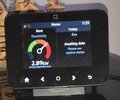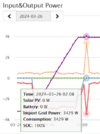- Joined
- 22 Mar 2024
- Messages
- 2
- Reaction score
- 0
- Country

Hi looking for some professional advice please.
I am considering getting a dedicate EV charging point fitted to the house. However from my research I'm trying to mitigate a a problem where the fuse box is not suitable by getting it upgraded prior to adding.
It currently has 8 way fitted with MCBs and main supply 100A fuse.
40A (twin oven)
32A (sockets)
32A (sockets)
16A (Old immersion repurposed for single socket in Bed3)
6A (lights)
6A (lights)
6A (lights)
6A (unused door bell only)
![IMG_8523[1].JPG IMG_8523[1].JPG](https://www.diynot.com/diy/attachments/img_8523-1-jpg.337564/)
I would like to initially add a 7KW 32A EVCP circuit and a spare way for future solar or outbuilding supply. One issue seems to be that just adding the EVCP would take above the 100A main fuse, so how would that be done? Although we are generally low power users.
My assumption is I need a modern CU with SPD, RCBO's (not seen 40A mini versions) for all circuits bar the EV charger?. (likely Zappi or Ohme home pro).
I would like advice on why type of CU spec I should be expecting to be quoted for. eg RCCB or RCBO, type A,B, or AC etc. I'd like one thats shallow depth as located in middle of wall in reception room. Also this is no where near the kitchen, so would bonding still need upgrading to 10mm and how? Sure it has 6mm currently.
What sort of cost should I be expecting?
Thanks.
I am considering getting a dedicate EV charging point fitted to the house. However from my research I'm trying to mitigate a a problem where the fuse box is not suitable by getting it upgraded prior to adding.
It currently has 8 way fitted with MCBs and main supply 100A fuse.
40A (twin oven)
32A (sockets)
32A (sockets)
16A (Old immersion repurposed for single socket in Bed3)
6A (lights)
6A (lights)
6A (lights)
6A (unused door bell only)
I would like to initially add a 7KW 32A EVCP circuit and a spare way for future solar or outbuilding supply. One issue seems to be that just adding the EVCP would take above the 100A main fuse, so how would that be done? Although we are generally low power users.
My assumption is I need a modern CU with SPD, RCBO's (not seen 40A mini versions) for all circuits bar the EV charger?. (likely Zappi or Ohme home pro).
I would like advice on why type of CU spec I should be expecting to be quoted for. eg RCCB or RCBO, type A,B, or AC etc. I'd like one thats shallow depth as located in middle of wall in reception room. Also this is no where near the kitchen, so would bonding still need upgrading to 10mm and how? Sure it has 6mm currently.
What sort of cost should I be expecting?
Thanks.


